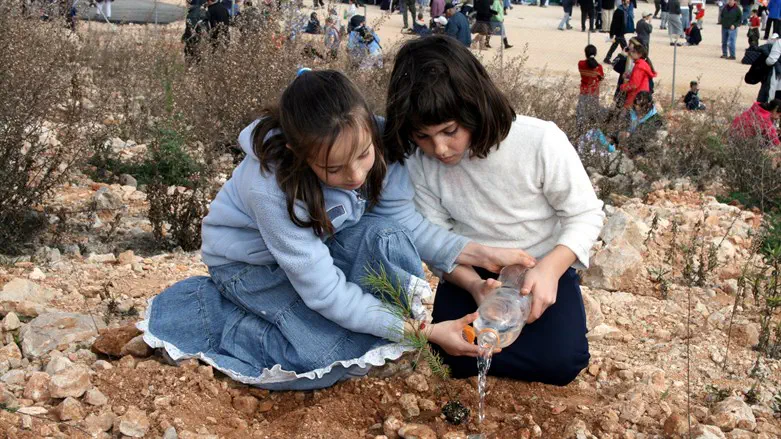
Tu Bishvat is, traditionally, a pleasant Jewish festival in which Jews reconnect to nature with the planting of trees.
It became a cornerstone of Zionism and the establishment of the Jewish State. Pictures of brawny men and attractive women tilling barren fields over a century ago portrayed the new Jew, prepared to have calloused hands and sweaty brow to revive a long dead nation.
This mission has been renewed in the age of climate change and the greening of the land.
Not anymore. Planting trees has become yet another cause to attack Israel.
The barren Negev has always been Israel’s biggest challenge harking back to the early sprouts of the nascent state.
To David Ben Gurion, Israel’s first Prime Minister and a driving force to revive the Negev, the vast desert space in southern Israel was one of his greatest challenges. His hope: To make it bloom and attract a thriving modern population.
He was so much a man of the Negev that he made his home in a simple Negev kibbutz hut and made it his wish to be buried in its earth.
So, shockingly, almost fifty years after his death, when the Jewish National Fund which, for one hundred and twenty years has been granted title to 13% of the land of Israel and entrusted to plant trees and green the land, tree planting in the Negev was violently disrupted by Bedouin Arabs. Fights took place between the Bedouin and the police.
The country was in uproar.
Bedouin shepherds have roamed the land for centuries with their goats and sheep, pitching their tents wherever it pleased them. Their presence was once looked at as a pleasant rural backdrop by tourists, but a nuisance to the people developing their country.
But now, the two cultures came into open conflict over issues badly handled by the current Israeli Government.
Let it be clear. The Negev Bedouin have never proved any legal claim to land on which they have pitched their tents and grazed their animals. They drifted into the area, they pitched their tents, they stayed, they are squatters.
They were offered new homes in collective areas where they can maintain their culture, their language, their religion and manage their own affairs as legitimate members of Israeli society. Some accepted. Most didn’t, preferring not to comply with any authority.
But for them to object to the planting of trees on state land is an affront to common sense.
First, the land in which the trees are to be planted is not legally theirs, not independently and not collectively, and people who profess to love the land surely should not object to having any land gifted with the protective shelter and shade of trees.
Furthermore, no one lives on the land selected for the Tu Bishvat tree planting.
Past Israeli governments have taken a benign attitude of tolerating the expansion of illegal structures across the Negev as anyone who drives south towards Beer Sheba has witnessed, but the vast spread of Bedouin squatters has become an intolerable obstacle to the development of this increasingly important region.
Conversely, the current riots over the planting of a few trees in one specific area comes within days of a controversial decision by the Knesset to provide electricity to an estimated 130,000 Arab Israelis living in illegally built homes in the Negev.
The juxtaposition of people living on land not theirs, who refuse generous governmental offers of new modern housing in structured collective communities, who are to be provided with a proper electricity system, yet violently riot against the planting of trees indicates they are stubbornly more willing to continue living in their illegal homes rather than join a modern society.
Furthermore, there is evidence that the situation is being made worse by malevolent outsiders who are trying to inflame the situation by portraying the Negev Bedouin as false martyrs of Arab Palestinianism and Islamism so as to turn the issue into a global confrontation against Israel and Jews.
And all that does is place another burning torch into the dead tinder of a sensitive issue.
Barry Shaw is Senior Associate at the Israel Institute for Strategic Studies.